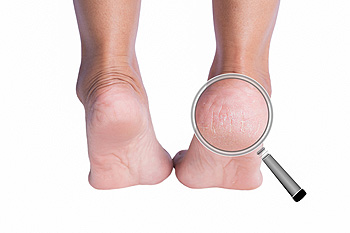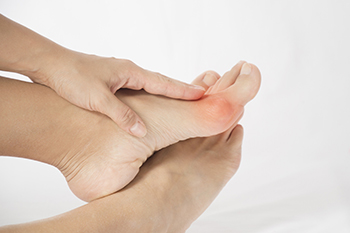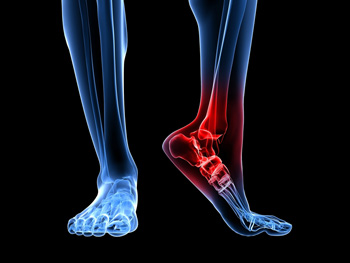Connect With Us
Blog
Items filtered by date: May 2021
Potential Reasons You Have Heel Pain
 The heel is designed to absorb the weight of your body when taking on most forms of exercising such as walking or running. Heel pain can be debilitating and can have an impact on your everyday life. The most common type of heel pain is plantar fasciitis. Plantar fasciitis can occur when the plantar fascia, the tissue that runs along the bottom of the foot and connects the heel to the toes, becomes inflamed. Heel spurs can be another cause of heel pain that may occur when calcium builds up in the heel and protrudes outward. When the fluid filled fibrous sac under the heel bone becomes inflamed, heel bursitis occurs. The heel bone is protected by a fat pad at the bottom of the heel, and if this pad becomes worn, pain can result as well. These are just some of the various causes of heel pain. If you are struggling with heel pain, consulting with a podiatrist for a proper diagnosis and treatment method is highly suggested.
The heel is designed to absorb the weight of your body when taking on most forms of exercising such as walking or running. Heel pain can be debilitating and can have an impact on your everyday life. The most common type of heel pain is plantar fasciitis. Plantar fasciitis can occur when the plantar fascia, the tissue that runs along the bottom of the foot and connects the heel to the toes, becomes inflamed. Heel spurs can be another cause of heel pain that may occur when calcium builds up in the heel and protrudes outward. When the fluid filled fibrous sac under the heel bone becomes inflamed, heel bursitis occurs. The heel bone is protected by a fat pad at the bottom of the heel, and if this pad becomes worn, pain can result as well. These are just some of the various causes of heel pain. If you are struggling with heel pain, consulting with a podiatrist for a proper diagnosis and treatment method is highly suggested.
Many people suffer from bouts of heel pain. For more information, contact one of our podiatrists of Crosstown Podiatry. Our doctors can provide the care you need to keep you pain-free and on your feet.
Causes of Heel Pain
Heel pain is often associated with plantar fasciitis. The plantar fascia is a band of tissues that extends along the bottom of the foot. A rip or tear in this ligament can cause inflammation of the tissue.
Achilles tendonitis is another cause of heel pain. Inflammation of the Achilles tendon will cause pain from fractures and muscle tearing. Lack of flexibility is also another symptom.
Heel spurs are another cause of pain. When the tissues of the plantar fascia undergo a great deal of stress, it can lead to ligament separation from the heel bone, causing heel spurs.
Why Might Heel Pain Occur?
- Wearing ill-fitting shoes
- Wearing non-supportive shoes
- Weight change
- Excessive running
Treatments
Heel pain should be treated as soon as possible for immediate results. Keeping your feet in a stress-free environment will help. If you suffer from Achilles tendonitis or plantar fasciitis, applying ice will reduce the swelling. Stretching before an exercise like running will help the muscles. Using all these tips will help make heel pain a condition of the past.
If you have any questions please contact our offices located in Wayne, Montclair, and Randolph, NJ . We offer the newest diagnostic and treatment technologies for all your foot and ankle needs.
The Growing Pains of Sever’s Disease
Sever’s disease, or calcaneal apophysitis, is a painful condition that occurs almost exclusively among growing children between five-to-twelve years old. During growth spurts when the body is changing rapidly, the Achilles tendon which attaches to the back of the calcaneus (heel) bone, can pull repeatedly on the growth plate, causing inflammation and pain at the site. Children who are active in sports—and put additional stress on that area of the heel by running and jumping—are at an increased risk of developing Sever’s disease. While Sever’s disease will go away in time when the growth plate closes, it can be a very painful condition and restrict a child from activities they enjoy. A podiatrist can create custom orthotics that are designed for the child’s individual foot to cushion and support the heel, and give them specific stretching and strengthening exercises as well as anti-inflammatory medicine to help any pain or swelling in the area.
Sever's disease often occurs in children and teens. If your child is experiencing foot or ankle pain, see one of our podiatrists from Crosstown Podiatry. Our doctors can treat your child’s foot and ankle needs.
Sever’s Disease
Sever’s disease is also known as calcaneal apophysitis, which is a medical condition that causes heel pain I none or both feet. The disease is known to affect children between the ages of 8 and 14.
Sever’s disease occurs when part of the child’s heel known as the growth plate (calcaneal epiphysis) is attached to the Achilles tendon. This area can suffer injury when the muscles and tendons of the growing foot do not keep pace with bone growth. Therefore, the constant pain which one experiences at the back of the heel will make the child unable to put any weight on the heel. The child is then forced to walk on their toes.
Symptoms
Acute pain – Pain associated with Sever’s disease is usually felt in the heel when the child engages in physical activity such as walking, jumping and or running.
Highly active – Children who are very active are among the most susceptible in experiencing Sever’s disease, because of the stress and tension placed on their feet.
If you have any questions, please feel free to contact our offices located in Wayne, Montclair, and Randolph, NJ . We offer the newest diagnostic and treatment technologies for all your foot and ankle injuries.
Reminder: When Was the Last Time...?
Reasons Cracked Heels Can Develop
 The foot condition that is known as cracked heels can become a medical issue without prompt treatment. This ailment can gradually develop from wearing shoes that have an open back, or from standing on hard surfaces for the majority of the day. Deep cracks in the skin are referred to as fissures, and can become infected without proper care. Existing medical conditions including diabetes and psoriasis can lead to the formation of cracked heels. Additionally, research has shown a deficiency in omega-3 or zinc can decrease the oil in the feet, and this may improve the chances of getting cracked heels. If you are afflicted with this condition, please consult with a podiatrist who can prescribe effective medication and offer mild relief options.
The foot condition that is known as cracked heels can become a medical issue without prompt treatment. This ailment can gradually develop from wearing shoes that have an open back, or from standing on hard surfaces for the majority of the day. Deep cracks in the skin are referred to as fissures, and can become infected without proper care. Existing medical conditions including diabetes and psoriasis can lead to the formation of cracked heels. Additionally, research has shown a deficiency in omega-3 or zinc can decrease the oil in the feet, and this may improve the chances of getting cracked heels. If you are afflicted with this condition, please consult with a podiatrist who can prescribe effective medication and offer mild relief options.
If the skin on your feet starts to crack, you may want to see a podiatrist to find treatment. If you have any concerns, contact one of our podiatrists from Crosstown Podiatry. Our doctors can provide the care you need to keep you pain-free and on your feet.
Cracked Heels
It is important to moisturize your cracked heels in order to prevent pain, bleeding, and infection. The reason cracked heels form is because the skin on the foot is too dry to support the immense pressure placed on them. When the foot expands, the dry skin on the foot begins to split.
Ways to Help Heal Them
- Invest in a good foot cream
- Try Using Petroleum Jelly
- Ease up on Soaps
- Drink Plenty of Water
Ways to Prevent Cracked Heels
- Moisturize After Showering
- Skip a Shower
- Keep Shower Water Lukewarm
- Don’t Scrub Your Feet
If you are unsure how to proceed in treating cracked heels, seek guidance from a podiatrist. Your doctor will help you with any questions or information you may need.
If you have any questions, please feel free to contact our offices located in Wayne, Montclair, and Randolph, NJ . We offer the newest diagnostic and treatment technologies for all your foot care needs.
Can Bunions Be Treated?
 The joint at the bottom of the big toe is often affected with an existing bunion. It can develop as a result of a misalignment of the big toe joint, and this can occur for a variety of reasons. These can include genetics, having flat feet, or from wearing shoes that do not fit properly. In severe bunions, the big toe may shift toward the other toes, which may cause pain and discomfort, in addition to possibly affecting proper balance. Larger shoes may need to be purchased that can accommodate the bunion. Surgery may be a necessary treatment option, and this can be successful in permanently removing the bunion. If you have developed a bunion, it is strongly suggested that you are under the care of a podiatrist who can help you with proper treatment decisions.
The joint at the bottom of the big toe is often affected with an existing bunion. It can develop as a result of a misalignment of the big toe joint, and this can occur for a variety of reasons. These can include genetics, having flat feet, or from wearing shoes that do not fit properly. In severe bunions, the big toe may shift toward the other toes, which may cause pain and discomfort, in addition to possibly affecting proper balance. Larger shoes may need to be purchased that can accommodate the bunion. Surgery may be a necessary treatment option, and this can be successful in permanently removing the bunion. If you have developed a bunion, it is strongly suggested that you are under the care of a podiatrist who can help you with proper treatment decisions.
If you are suffering from bunions, contact one of our podiatrists of Crosstown Podiatry. Our doctors can provide the care you need to keep you pain-free and on your feet.
What Is a Bunion?
A bunion is formed of swollen tissue or an enlargement of boney growth, usually located at the base joint of the toe that connects to the foot. The swelling occurs due to the bones in the big toe shifting inward, which impacts the other toes of the foot. This causes the area around the base of the big toe to become inflamed and painful.
Why Do Bunions Form?
Genetics – Susceptibility to bunions are often hereditary
Stress on the feet – Poorly fitted and uncomfortable footwear that places stress on feet, such as heels, can worsen existing bunions
How Are Bunions Diagnosed?
Doctors often perform two tests – blood tests and x-rays – when trying to diagnose bunions, especially in the early stages of development. Blood tests help determine if the foot pain is being caused by something else, such as arthritis, while x-rays provide a clear picture of your bone structure to your doctor.
How Are Bunions Treated?
- Refrain from wearing heels or similar shoes that cause discomfort
- Select wider shoes that can provide more comfort and reduce pain
- Anti-inflammatory and pain management drugs
- Orthotics or foot inserts
- Surgery
If you have any questions, please feel free to contact our offices located in Wayne, Montclair, and Randolph, NJ . We offer the newest diagnostic and treatment technologies for all your foot care needs.


